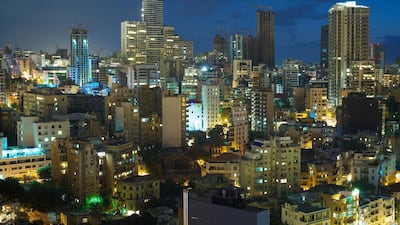Last week, anyone in Lebanon who cared to listen would have heard or read of some serious fighting talk from two of the country's most senior public servants. On Friday, the economy minister Raed Khoury sacked one of the Port of Beirut's director generals for what, as far as I could tell, amounted to gross misconduct, and declared that "the fight against corruption has started. It's a long way that we will be taking but we will never back off."
He added, with more than a degree of sang froid, that he had been forced to turn off his mobile phone, such was the political pressure being applied to spare the man's job.
So the battle against corruption is on, is it? Let's see. Mr Khoury is a supporter of president Michel Aoun, whose Free Patriotic Movement (FPM) has vowed to stamp out the chronic criminality that has always defined Lebanese life, but which in recent years has reached breathtaking levels, all but bringing the country to its knees.
As the former head of the Lebanese army, president Aoun revels in the role of the career army officer who can't be bought. But even though the FPM came to power on a very clear anti-corruption ticket, it now finds itself susceptible to charges of corruption alongside the rest of the country's political class.
_______________
Read more:
Lebanon parking is in a world of its own
_______________
To make matters worse, the FPM is an ally of Hizbollah, a party that has used violence to achieve its political ends, and whose armed wings, through its various activities at home and abroad, have hampered Lebanon's economic growth and stained its international reputation.
Indeed, last month Transparency International (TI) reported that Lebanon had nosedived in the agency's annual corruption index. The country is marginally more ethical than Burma, Guinea and Nigeria, but more dishonest than Iran, Nepal, Kazakhstan, Russia, Ukraine, Guatemala and Kyrgyzstan.
According to TI, Lebanon belong to a group of countries in which people and businesses "face situations of bribery and extortion, rely on basic services that have been undermined by the misappropriation of funds, and confront official indifference when seeking redress from authorities that are on the take".
In reality, the FPM's anti-
corruption position is empty and worthless; Mr Khoury knows he has called for the impossible as long as the current political status quo remains in place. His exhortations are another example of Lebanese hot air and another slap in the face to a citizenry that has put up with it for too long.
On the same day that Mr Khoury launched his "fight against corruption", prime minister Saad Hariri opened a power plant in the northern city of Tripoli, telling the audience that his cabinet had decided to find an extra 800 megawatts of power within three to six months, "because 24/7 electricity is our goal". It wasn't quite as thunderous as his cabinet colleague's broadside on corruption, but it's still a brave man who predicts full-time power in Lebanon. Just ask every newly appointed energy minister since the war who has promised such a thing would happen on his watch.
The problem is that Electricite du Liban, the national power company, sells electricity at 40 per cent less than cost. The utility is simply unable to collect all its bills and is bloated with political appointees. The upshot is that the national grid costs the state US$2 billion a year.
The Lebanese public would be more than happy to pay the full rate of $0.15 per kilowatt if it wasn't paying an extra $0.35 per kilowatt to the powerful generator mafia to make up the government's shortfall. The state has two challenges: firstly, to find the extra, preferably clean, power, and secondly, to slowly dismantle a sector that has been part of the grey economy for 25 years and which in many cases is protected by political clout.
Mr Hariri is right to address the problem, but like Mr Khoury, the country desperately needs action rather than words. The electricity crisis has hampered the country's attempt to attract foreign investment, stunting economic growth for nearly 30 years. It has also worn away at the patience of millions of Lebanese, who have been forced to buy electricity from the black market.
Finally, and this is probably the most tragic element to this whole sorry story, it has affected the health of tens, perhaps hundreds, of thousands of people who have been forced to live with unregulated toxic emissions. Cancer rates are apparently through the roof and nothing is being done.
And if I were a gambling man, I'd wager nothing will be done any time soon on both counts.
Michael Karam is a freelance writer who lives between Beirut and Brighton

